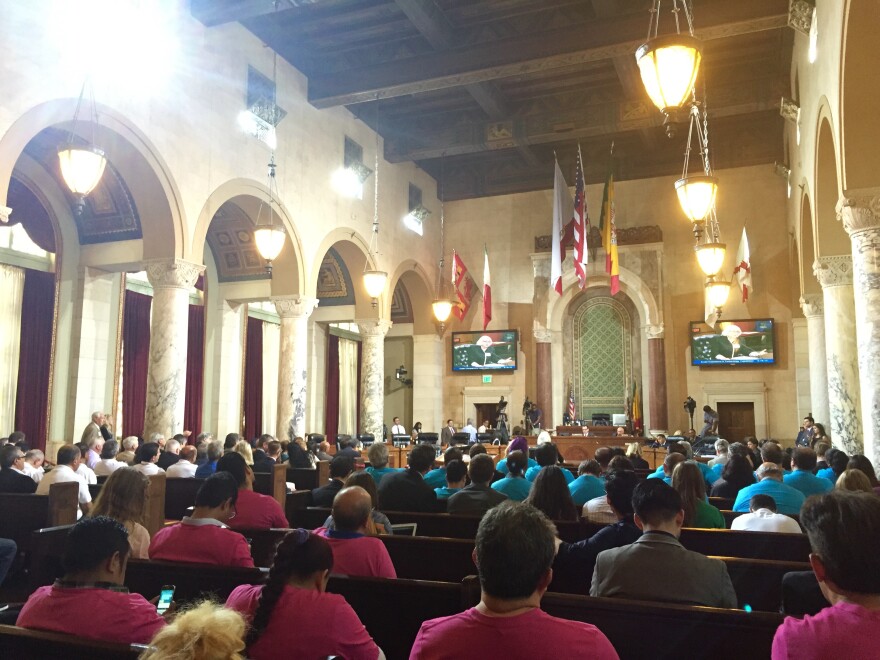This story is free to read because readers choose to support LAist. If you find value in independent local reporting, make a donation to power our newsroom today.
This archival content was originally written for and published on KPCC.org. Keep in mind that links and images may no longer work — and references may be outdated.
LAX decision offers city only chance to regulate rideshare operators like Uber and Lyft

As a debate over allowing Uber and Lyft at LAX unfolds at Los Angeles' City Hall, some members of the L.A. City Council are using the opportunity to try to impose requirements on an industry outside its jurisdiction.
While the city of L.A. regulates and licenses taxis, it doesn't have the same authority over rideshare operators. That responsibility falls to the California Public Utilities Commission, which in 2013 put in place a new legal framework for companies like Uber and Lyft, classified as Transportation Network Companies.
The PUC, more familiar as an agency that deals with gas pipelines and electricity, also regulates private transportation networks in the state, like charter buses and limousine services, and oversees safety issues for all rail lines.
The PUC requires rideshare companies to conduct name-based background checks on drivers and carry a minimum $1 million insurance during trips, but their rules differ from those imposed on taxi companies by cities like L.A.
"It's very modest regulation," said Paul Koretz, who has been one of the chief critics on the City Council of rideshare companies. "There are a lot of concerns remaining, especially about safety."
Koretz and fellow Council member Paul Krekorian have long expressed concerns that Uber and Lyft aren't required by the PUC to conduct the same background checks as taxi companies, including running fingerprints through a national FBI database.
Currently, the rideshare companies use a third-party system to run names and Social Security numbers, a process that is faster than fingerprinting.
During the Council's Trade, Commerce and Technology committee meeting Tuesday, Krekorian criticized the way the PUC regulations had been crafted.
"I very much wish they had left more room for local officials to modify according to local concerns," he said.
In lieu of the authority to mandate fingerprinting for rideshare companies, City Council members are looking to their role as gatekeepers of LAX, the second busiest airport in the nation and a highly lucrative place for drivers.
"We have the leverage to do it at LAX," said Koretz.
The Council is currently using that leverage to review a July decision by the Airport Commission to offer permits to rideshare companies to pick up passengers at LAX .
The City Council has the power to review and overturn actions of city commissions, so earlier this month 12 council members voted to review the airport's decision to allow rideshare pick-ups, with members like Koretz and Krekorian embracing the opportunity to add fingerprinting as a requirement.
During the committee hearing Tuesday, officials from Los Angeles World Airports, which runs LAX, explained their decision not to make fingerprinting a requirement in their proposed licensing agreement.
"This is an issue of consistency," said Stephen Martin, COO for LAWA, as he explained that the airport's licensing agreement with taxis and limos likewise does not require fingerprinting.
The Board of Airport Commissioners plan would allow rideshare companies to apply for a permit to pick up passengers under a non-exclusive licensing agreement that would impose certain restrictions: rideshare cars would be charged $4 for each pick-up and dropoff at LAX, only 40 such cars would be allowed at the airport at a time and all would have to both drop off and pick up customers at the Arrivals section. The companies would also be required to pay at least $25,000 a month to the airport.
The TCT Committee voted narrowly Tuesday to support the airport's existing plan to allow rideshare operators. The full City Council is expected to take up the issue as early as next Tuesday.







